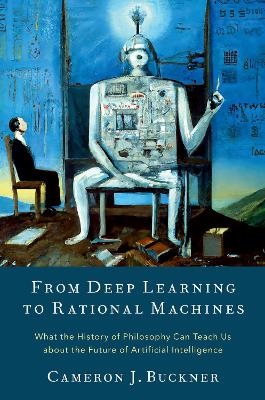
From Deep Learning to Rational Machines
Oxford University Press Inc (Verlag)
978-0-19-765330-2 (ISBN)
This book provides a framework for thinking about foundational philosophical questions surrounding the use of deep artificial neural networks ("deep learning") to achieve artificial intelligence. Specifically, it links recent breakthroughs to classic works in empiricist philosophy of mind. In recent assessments of deep learning's potential, scientists have cited historical figures from the philosophical debate between nativism and empiricism, which concerns the origins of abstract knowledge. These empiricists were faculty psychologists; that is, they argued that the extraction of abstract knowledge from experience involves the active engagement of psychological faculties such as perception, memory, imagination, attention, and empathy. This book explains how recent deep learning breakthroughs realized some of the most ambitious ideas about these faculties from philosophers such as Aristotle, Ibn Sina (Avicenna), John Locke, David Hume, William James, and Sophie de Grouchy. It illustrates the utility of this interdisciplinary connection by showing how it can provide benefits to both philosophy and computer science: computer scientists can continue to mine the history of philosophy for ideas and aspirational targets to hit, and philosophers can see how some of the historical empiricists' most ambitious speculations can now be realized in specific computational systems.
Cameron J. Buckner is an Associate Professor in the Department of Philosophy at the University of Houston. He received an Alexander von Humboldt Postdoctoral Fellowship at Ruhr-University Bochum from 2011 to 2013 and has been a visiting fellow at the University of Cambridge.
Acknowledgments
Preface
Note on Abbreviated Citations to Historical Works
1 Moderate Empiricism and Machine Learning
1.1 Playing with fire? Nature vs. nurture for computer science
1.2 How to simmer things down: From Forms and slates to styles of learning
1.3 From dichotomy to continuum
1.4 Of faculties and fairness: Introducing the new empiricist DoGMA
1.5 Of models and minds
1.6 Other dimensions of the rationalist-empiricist debate
1.7 The DoGMA in relation to other recent revivals of empiricism
1.8 Basic strategy of the book: Understanding deep learning through empiricist faculty psychology
2 What is Deep Learning, and How Should We Evaluate Its Potential?
2.1 Intuitive inference as deep learning's distinctive strength
2.2 Deep learning: Other marquee achievements
2.3 Deep learning: Questions and concerns
2.4 Can we (fairly) measure success? Artificial intelligence vs. artificial rationality
2.5 Avoiding comparative biases: Lessons from comparative psychology for the science of machine behavior
2.6 Summary
3 Perception
3.1 The importance of perceptual abstraction in empiricist accounts of reasoning
3.2 Four approaches to abstraction from the historical empiricists
3.3 Transformational abstraction: Conceptual foundations
3.4 Deep convolutional neural networks: Basic features
3.5 Transformational abstraction in DCNNs
3.6 Challenges for DCNNs as models of transformational abstraction
3.7 Summary
4 Memory
4.1 The trouble with quantifying human perceptual experience
4.2 Generalization and catastrophic interference
4.3 Empiricists on the role of memory in abstraction
4.4 Artificial neural network models of memory consolidation
4.5 Deep reinforcement learning
4.6 Deep-Q Learning and Episodic Control
4.7 Remaining questions about modeling memory
4.8 Summary
5 Imagination
5.1 Imagination: The mind's laboratory
5.2 Fodor's challenges, and Hume's imaginative answers
5.3 Imagination's role in synthesizing ideas: Autoencoders and Generative Adversarial Networks
5.4 Imagination's role in synthesizing novel composite ideas: vector interpolation, variational autoencoders, and transformers
5.5 Imagination's role in creativity: Creative Adversarial Networks
5.6 Imagination's role in simulating experience: Imagination-Augmented Agents
5.7 Biological plausibility and the road ahead
5.8 Summary
6 Attention
6.1 Introduction: Bootstrapping control
6.2 Contemporary theories of attention in philosophy and psychology
6.3 James on attention as ideational preparation
6.4 Attention-like mechanisms in DNN architectures
6.5 Language models, self-attention, and transformers
6.6 Interest and innateness
6.7 Attention, inner speech, consciousness, and control
6.8 Summary
7 Social and Moral Cognition
7.1 From individual to social cognition
7.2 Social cognition as Machiavellian struggle
7.3 Smith and De Grouchy's sentimentalist approach to social cognition
7.4 A Grouchean developmentalist framework for modeling social cognition in artificial agents
7.5 Summary
Epilogue
References
Index
| Erscheinungsdatum | 29.11.2023 |
|---|---|
| Verlagsort | New York |
| Sprache | englisch |
| Maße | 152 x 198 mm |
| Gewicht | 567 g |
| Themenwelt | Geisteswissenschaften ► Philosophie |
| Informatik ► Theorie / Studium ► Künstliche Intelligenz / Robotik | |
| ISBN-10 | 0-19-765330-8 / 0197653308 |
| ISBN-13 | 978-0-19-765330-2 / 9780197653302 |
| Zustand | Neuware |
| Informationen gemäß Produktsicherheitsverordnung (GPSR) | |
| Haben Sie eine Frage zum Produkt? |
aus dem Bereich


